Fleurs du Mal Magazine


Or see the index
Wir leben im Zeitalter des Gedichts.
Die Poesie ist auf Erfolgskurs, schließlich sind einige der begabtesten Autoren einer ganzen Generation in der Lyrikszene zu finden. Warum das so ist und was die Lyrik der Gegenwart auszeichnet, erzählt Christian Metz in seinem grundlegenden Essay.
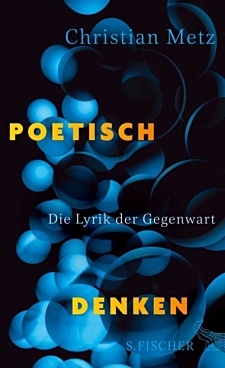 Angetrieben von den epochalen Veränderungen unserer Zeit forciert die Lyrik der Gegenwart ein poetisches Denken. Es ist ein Denken mit poetischen Mitteln, das der sinnlichen Erfahrung, der Leidenschaft und dem Spiel Raum gibt. In dieses poetische Denken führt Metz systematisch ein. Ausgehend von ihren Gemeinsamkeiten folgt Metz einigen der wichtigsten Autorinnen und Autoren der neuen Lyrik – wie Monika Rinck und Jan Wagner, Ann Cotten und Steffen Popp – in ihr poetisches Universum.
Angetrieben von den epochalen Veränderungen unserer Zeit forciert die Lyrik der Gegenwart ein poetisches Denken. Es ist ein Denken mit poetischen Mitteln, das der sinnlichen Erfahrung, der Leidenschaft und dem Spiel Raum gibt. In dieses poetische Denken führt Metz systematisch ein. Ausgehend von ihren Gemeinsamkeiten folgt Metz einigen der wichtigsten Autorinnen und Autoren der neuen Lyrik – wie Monika Rinck und Jan Wagner, Ann Cotten und Steffen Popp – in ihr poetisches Universum.
Christian Metz, geboren 1975, nach seiner Rückkehr von der Cornell University Stipendiat der Alexander von Humboldt-Stiftung an der LMU in München. Jahrelang wissenschaftlicher Mitarbeiter am Institut für deutsche Literatur und ihre Didaktik an der Goethe-Universität Frankfurt und Literaturkritiker für die »Frankfurter Allgemeine Zeitung«. Promotion mit einer Arbeit zur »Narratologie der Liebe«. Habilitation zum Thema: »Kitzel. Studien zur Kultur einer menschlichen Empfindung«, deren Monographie bei S. Fischer Wissenschaft im Herbst 2019 erscheint. Lehraufträge an der Humboldt-Universität zu Berlin und der Universität Tromsø (Norwegen). Schwerpunkte in Forschung und Lehre: Literatur vom 17. Jahrhundert bis zur Gegenwart, Literaturtheorie, Anthropologie und Literatur. Gemeinsam mit Ina Hartwig und Oliver Vogel Herausgeber der »Neuen Rundschau. Gegenwartsliteratur!« (Heft 2015/1).
Christian Metz
Poetisch denken
Die Lyrik der Gegenwart
Erscheinungstermin: 04.10.2018
Umfang: 432 Seiten
Paperback
ISBN-10: 3100024400
ISBN-13: 978-3100024404
Verlag: S. FISCHER
Lyrik
Sprache: Deutsch
Nr. 473 in Literaturkritik
Nr. 14136 in Film, Kunst & Kultur
432 Seiten
13,4 x 3,2 x 21,5 cm
Paperback Preis € 20,00
# new books
Christian Metz
Poetisch denken
• fleursdumal.nl magazine
More in: - Book News, - Bookstores, Archive M-N, Archive M-N, Art & Literature News, MODERN POETRY, STREET POETRY
Terwijl Reinaert de Vos tijdens het monopoly-spelen met zijn kinderen stiekem een briefje van duizend uit de bank jatte en zich te goed deed aan een kipkluifje, verklaarde Koning Nobel in de paleistuin de jaarlijkse Hofdag voor geopend.
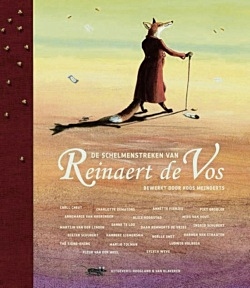 Met de opening van de Hofdag opent ook de fonkelende bewerking die Koos Meinderts maakte van het bekendste epos uit de Middelnederlandse literatuur: Van den Vos Reynaerde.
Met de opening van de Hofdag opent ook de fonkelende bewerking die Koos Meinderts maakte van het bekendste epos uit de Middelnederlandse literatuur: Van den Vos Reynaerde.
In achttien hoofdstukken verhaalt Meinderts over de belevenissen van de geslepen vos Reinaert en zijn beklagenswaardige tegenspelers, waaronder Tibeert de Kater, Bruun de Beer en Cuwaert de Haas. Elk hoofdstuk werd geïllustreerd door een vooraanstaand kinderboekillustrator.
Koos Meinderts:
De schelmenstreken van Reinaert de Vos
1e druk
EAN: 978 90 8967 273 5
NUR: 274
Verschenen 12-11-2018
Formaat: 23,5 x 27 cm
48 bladzijden
Gebondend
Bindwijze Hardcover
Genre Kinderboeken
Uitgever Hoogland & Van Klaveren, Uitgeverij
Taal Nederlands
Illustraties Charlotte Dematons e.a.
Prijs: € 17,50
# New books
Koos Meinderts
Reinaert de Vos
• fleursdumal.nl magazine
More in: - Book News, - Book Stories, Archive M-N, Archive Q-R, Archive Q-R, Art & Literature News, Grimm, Andersen e.o.: Fables, Fairy Tales & Stories
Een tik op zijn schouder. Hij trekt de plaid van zijn gezicht en opent zijn ogen. Het is Afke.
`Je was tegen iemand aan het praten.’
`Ik praatte met Tijger en Thija.’
`Over school?’
`Goh, dat ik zo duidelijk praat als ik droom.’
Ze helpt hem van het bed in zijn stoel. Ze helpt hem vaak. Tegenover haar voelt hij niet de gêne die hij wel voelt bij zijn vrouw en zijn dochter. Soms is ook Zhia erbij. Dan helpen ze hem als twee jonge verpleegsters.
Zijn vrouw haat het als de meisjes boven zijn, al weet hij niet waarom.
 `Je bent nat van het zweet.’
`Je bent nat van het zweet.’
`Dat komt door de medicijnen. Ik zweet nog als het vriest.’
Ze trekt zijn overhemd uit.
`De haren op je rug zijn nog zwart.’ Ze droogt zijn rug en hals. `Had je vroeger zwart haar? Vonden de meisjes je knap?’
`Er waren hier niet zo veel meisjes. Het dorp was nog klein.’
`En die paar dan?’
`Thija vond me knap. Maar ik denk dat ze Tijger knapper vond.’
`En oma?’
`Toen zij een meisje was? Ze wilde me alleen hebben omdat ze jaloers was op Thija. Dat denk ik nu.’
`Vond jij haar knap?’
`Anders.’
`Je was toch wel verliefd op haar? Je bent toch met haar getrouwd?’
`Het liep nu eenmaal zo. Er waren hier maar een paar meisjes, dat zei ik toch. Kemp wilde haar ook.’
`Ben je met haar getrouwd omdat je haar niet aan Kemp gunde?’
`Ja.’ Tegen haar kan hij alleen maar eerlijk zijn.
`Wel vreemd’, zegt ze. `Nu heb ik precies zulke grootvaders zoals jij had.’
`Hoezo?’
`Jij zegt toch altijd dat ze elkaar niet mochten.’
Ze rijdt hem voor de wastafel.
`Moet ik je scheren?’
`Ik doe het zelf.’
Ze pakt het mes uit de la, haalt het uit de houder en pakt kwast en scheerzeep uit de kast.
`Scheerzeep ruikt lekker.’
`Het ruikt naar jongens.’
`Jongens! Was je gelukkig als kind?’
`Alleen toen Tijger en Thija er nog waren.’
`Er waren toch ook anderen die van je hielden.’
`Wie dan?’
`Je moeder.’
`Dat is ook zo.’
`Ik hou ook van je.’
Hij ziet haar oprechte gezicht in de spiegel.
`Het is waar’, zegt hij. `Jij houdt net zo veel van mij als ik van jou. En je opa Kemp?’
`Van hem hou ik ook. Anders. Zal ik je inzepen?’ Ze haalt de kwast door het schuim en zeept hem zorgvuldig in. `Ik kan je ook scheren. Laat mij het maar doen. Jij snijdt je te vaak.’
`Ik heb een zware baard. Een scheerapparaat werkt niet bij mij.’
`Voortaan scheer ik je wel.’ Ze zet het mes aan. Protesteren helpt niet. Hij voelt hoe zacht het mes over zijn huid glijdt. In de spiegel ziet hij de inspanning op haar gezicht. Hij blijft muisstil zitten. Ze wil het beter doen dan hij.
Terwijl ze met hem bezig is, hoort hij een zacht gebrom, door de muur heen. Net alsof in het buurhuis een of ander apparaat aanstaat. Hij spant zich in om het geluid te kunnen traceren. Het kan ook een vliegtuig zijn, ver weg.
`Klaar’, zegt ze triomfantelijk en ze bet zijn gezicht. `Geen bloed. Zie je dat ik het beter kan.’
`Mooi. Je moet verpleegster worden.’
`Later ga ik met dieren werken. In een circus. Of bij een dierenarts. Of in een asiel. Zhia wordt verpleegster. Of dokter. Ze wil naar Afrika. Of in een kindertehuis.’
`Dat jullie al zo goed weten wat je wilt! Toen ik twaalf was, wist ik nog niets.’
Hij hoort de voordeur dichtslaan.
`Kan ik boven komen?’
`Kom maar’, roept Afke.
Zhia holt de trap op en komt de kamer binnen.
`Bij de silo is een ongeluk gebeurd’, hijgt Zhia.
`Ernstig?’ schrikt Mels.
`Een witte muis is van het dak gevallen. Recht in de bek van een buizerd.’
`Dat is dubbele pech’, zegt Mels.
`Of dubbel geluk’, zegt Zhia. `Misschien was de muis blij dat ze werd opgevreten en dat ze niet te pletter viel.’
`Van dat laatste had ze niets gevoeld’, zegt Mels. `Maar zo’n roofvogel die je verslindt, dat is wel erg.’
`Het is niet waar’, zegt Zhia. `Het was geen witte muis, het was een zwarte.’
Afke trekt hem een overhemd aan en maakt de knoopjes dicht.
`We moeten naar school. Na het avondeten kom ik weer, als je zin hebt in vertellen.’
`Daar heb ik altijd zin in.’
Hij hoort hen de trap af lopen. De deur valt dicht.
Ze hollen weg. Hij luistert tot hij niets meer hoort in de straat. Hij weet weer voor wie hij leeft.
Hij rolt naar de kast en pakt het boek. Elke dag kijkt hij er even in. Het boek dat Thija aan Tijger heeft gegeven toen hij twaalf werd, maar dat hij niet wilde. `Chine, pays inconnu.’ `Les couleurs pastel de la Chine’, leest hij onder een foto van een rivier van blauw krijt. De oevers zijn van pastelkleurig paars, de lucht is blauw en vet van de regen en gepokt met zwarte ganzen die zich op het water laten vallen. Boten met rieten daken, met naakte jongens voorop die met een stok de diepte peilen, drijven op het water.
De foto van een riviertje van blauw porselein, en een man in een bootje van bamboe, omringd door groenten met de kleur van gras. `Un homme transporte des légumes’.
Hij zet het boek terug, rolt naar het bureau en opent het album met de levenslopen van de directeuren van de fabriek. Hun levensbeschrijvingen, hun foto’s en doodsprentjes. Hij is bezig ze te ordenen, er een lijn in te krijgen.
Een grote leugen is het doodsprentje van Frans-Joseph Hubben, waarop te lezen staat dat hij zijn leven lang gehoorzaam aan God is geweest en een goed en trouw echtgenoot en vader was. Mels weet beter. Meneer Frans-Joseph kwam zelden in de kerk. Vlak na de verkoop van de fabriek is hij in Zwitserland gestorven aan een hartaanval, naar men zegt nadat ze hem uit een café hadden gezet waar hij vrouwen lastigviel.
Ton van Reen: Het diepste blauw (086)
wordt vervolgd
• fleursdumal.nl magazine
More in: - Book News, - Het diepste blauw, Archive Q-R, Reen, Ton van
Christian Kunda Mutoki porte un nouveau regard sur Le Horla de Guy de Maupassant.
 Il est précédé d’une préface et suivi d’une postface.
Il est précédé d’une préface et suivi d’une postface.
Il vient rafraîchir les problématiques qui touchent à la morale, à l’athéisme, à des amours tumultueuses et infidèles. . .
Le monde d’aujourd’hui diffère-t-il de celui décrit au XIXe siècle par l’écrivain français ? La science a-t-elle amélioré la condition existentielle de l’homme ?
Voici quelques questions majeures qui trouvent ici un regard neuf.
Christian Kunda Mutoki a préparé sa thèse de doctorat à l’Université Paul Verlaine, actuelle Université de la Lorraine (Metz, France). Il est écrivain et professeur de Littérature et civilisation françaises à l’Université de Lubumbashi, en RDC.
GUY DE MAUPASSANT
Une certaine idée de l’homme dans Le Horla
Christian Kunda Mutoki
Cahiers des sciences du langage
Langue Linguistique Littérature
Broché
Format : 15,5 x 24 cm
ISBN : 978-2-8066-3665-2
14 décembre 2018
70 pages
€ 11,5
# New books
Une certaine idée de l’homme dans Le Horla
de Guy de Maupassant
Christian Kunda Mutoki
• fleursdumal.nl magazine
More in: - Book News, - Bookstores, Archive M-N, Archive M-N, Art & Literature News, Guy de Maupassant, Maupassant, Guy de, Maupassant, Guy de
The final book from one of Europe’s cultural giants: an entertaining collection of essays about the modern world – from unbridled individualism to mobile phones.
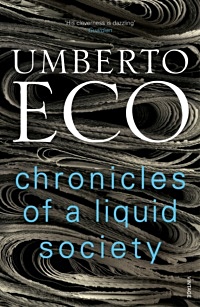 Umberto Eco was an international cultural superstar. A celebrated essayist as well as novelist, in this, his last collection, he explores many aspects of the modern world with irrepressible curiosity and wisdom written in his uniquely ironic voice.
Umberto Eco was an international cultural superstar. A celebrated essayist as well as novelist, in this, his last collection, he explores many aspects of the modern world with irrepressible curiosity and wisdom written in his uniquely ironic voice.
Written by Eco as articles for his regular column in l’Espresso magazine, he brings his dazzling erudition, incisiveness and keen sense of the everyday to bear on topics such as popular culture and politics, unbridled individualism, conspiracies, the old and the young, mobile phones, mass media, racism, good manners and the crisis in ideological values.
It is a final gift to his readers – astute, witty and illuminating.
“ A swan song from one of Europe’s great intellectuals…Eco entertains with his intellect, humor, and insatiable curiosity…there’s much here to enjoy and ponder ”. Tim Parks, Guardian
Chronicles of a Liquid Society
by Umberto Eco
Paperback
ISBN 9781784705206
Hardback
ISNB 9781911215318
2017/2018
Harvill Secker / Vintage
320 pages
Language & Literary Studies
# New books
Chronicles of a Liquid Society
by Umberto Eco
• fleursdumal.nl magazine
More in: - Book News, - Bookstores, Archive E-F, Art & Literature News, AUDIO, CINEMA, RADIO & TV, DICTIONARY OF IDEAS, MONTAIGNE, Museum of Literary Treasures, NONFICTION: ESSAYS & STORIES, Umberto Eco
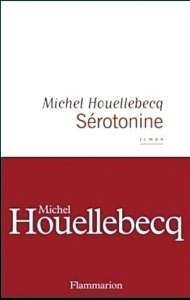 «Mes croyances sont limitées, mais elles sont violentes. Je crois à la possibilité du royaume restreint. Je crois à l’amour» écrivait récemment Michel Houellebecq.
«Mes croyances sont limitées, mais elles sont violentes. Je crois à la possibilité du royaume restreint. Je crois à l’amour» écrivait récemment Michel Houellebecq.
Le narrateur de Sérotonine approuverait sans réserve. Son récit traverse une France qui piétine ses traditions, banalise ses villes, détruit ses campagnes au bord de la révolte. Il raconte sa vie d’ingénieur agronome, son amitié pour un aristocrate agriculteur (un inoubliable personnage de roman – son double inversé), l’échec des idéaux de leur jeunesse, l’espoir peut-être insensé de retrouver une femme perdue.
Ce roman sur les ravages d’un monde sans bonté, sans solidarité, aux mutations devenues incontrôlables, est aussi un roman sur le remords et le regret.
Michel Houellebecq
Sérotonine
Littérature française
Flammarion
À paraître le 04/01/2019
352 pages
139 x 210 mm
Broché
EAN : 9782081471757
ISBN : 9782081471757
€ 22,00
# Nouveau roman
Michel Houellebecq
Sérotonine
•fleursdumal.nl magazine
More in: - Book News, - Bookstores, Archive G-H, Art & Literature News, Michel Houellebecq
`Als we China hebben gezien, zullen we pas begrijpen hoe nietig het hier allemaal is’, zegt Tijger.
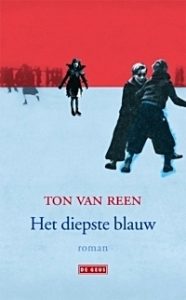 `Hoe klein het dorp is, hoe smal de beek, hoe de fabriek stinkt.’
`Hoe klein het dorp is, hoe smal de beek, hoe de fabriek stinkt.’
`Jij hoeft helemaal niet op reis te gaan om dat te ontdekken’, zegt Thija. `Jij weet het nu al.’
`Na de zomervakantie gaan we ieder naar een andere school’, zegt Tijger.
`Het is ellendig’, zegt Mels. `Ik wil helemaal niet naar een andere school. We moeten bij elkaar blijven.’
`We hebben er niets over te zeggen’, zegt Tijger. `Het is allemaal al beslist.’
`Stom’, zegt Thija. `Ik zal jullie maanden niet zien.’
`Dat is het ergst van alles,’ zegt Mels, `dat jij naar kostschool moet.’
`Ik wil het niet. Mijn váder wil het.’
`Ons vragen ze niets’, zegt Mels.
Ton van Reen: Het diepste blauw (085)
wordt vervolgd
fleursdumal.nl magazine
More in: - Book News, - Het diepste blauw, Archive Q-R, Reen, Ton van
The Balkans, in particular the turbulent ex-Yugoslav territory, have been among the most important world regions in Noam Chomsky’s political reflections and activism for decades.
His articles, public talks, and correspondence have provided a critical voice on political and social issues crucial not only to the region but the entire international community, including “humanitarian intervention,” the relevance of international law in today’s politics, media manipulations, and economic crisis as a means of political control.
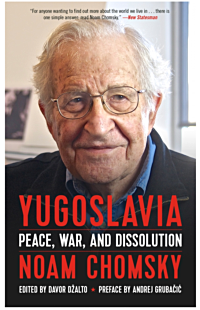 This volume provides a comprehensive survey of virtually all of Chomsky’s texts and public talks that focus on the region of the former Yugoslavia, from the 1970s to the present. With numerous articles and interviews, this collection presents a wealth of materials appearing in book form for the first time along with reflections on events twenty-five years after the official end of communist Yugoslavia and the beginning of the war in Bosnia.
This volume provides a comprehensive survey of virtually all of Chomsky’s texts and public talks that focus on the region of the former Yugoslavia, from the 1970s to the present. With numerous articles and interviews, this collection presents a wealth of materials appearing in book form for the first time along with reflections on events twenty-five years after the official end of communist Yugoslavia and the beginning of the war in Bosnia.
The book opens with a personal and wide-ranging preface by Andrej Grubačić that affirms the ongoing importance of Yugoslav history and identity, providing a context for understanding Yugoslavia as an experiment in self-management, antifascism, and mutlethnic coexistence.
Noam Chomsky (1928) is Institute Professor in the Department of Linguistics and Philosophy at the Massachusetts Institute of Technology, Boston. A member of the American Academy of Science, he has published widely in both linguistics and current affairs. His books include At War with Asia, Towards a New Cold War, Fateful Triangle: The U. S., Israel and the Palestinians, Necessary Illusions, Hegemony or Survival, Deterring Democracy, Failed States: The Abuse of Power and the Assault on Democracy and Manufacturing Consent: The Political Economy of the Mass Media.
Title: Yugoslavia: Peace, War, and Dissolution
Author: Noam Chomsky
Edited by Davor Džalto
Preface by Andrej Grubačić
Subjects: Politics / History-Europe
Publisher: PM Press
ISBN: 978-1-62963-442-5
Published: 04/2018
Language: English
Format: Paperback
Size: 6×9
240 pages
$15.63
# new books
Noam Chomsky
Yugoslavia: Peace, War, and Dissolution
• fleursdumal.nl magazine
More in: - Book News, - Book Stories, Archive C-D, AUDIO, CINEMA, RADIO & TV, MONTAIGNE, Noam Chomsky, WAR & PEACE
Vanaf 30 november 2018 tot 28 april 2019 presenteert het Bonnefantenmuseum het omvangrijke retrospectief Someone is in my House van de Amerikaanse kunstenaar David Lynch.
 Hoewel David Lynch onmiskenbaar een spilfiguur is in de internationale film- en tv-wereld, is zijn werk als beeldend kunstenaar veel minder bekend. Dat is op zijn minst vreemd, aangezien Lynch zelf altijd heeft benadrukt dat hij zichzelf vóór alles ziet als beeldend kunstenaar.
Hoewel David Lynch onmiskenbaar een spilfiguur is in de internationale film- en tv-wereld, is zijn werk als beeldend kunstenaar veel minder bekend. Dat is op zijn minst vreemd, aangezien Lynch zelf altijd heeft benadrukt dat hij zichzelf vóór alles ziet als beeldend kunstenaar.
Een beeldend kunstenaar die tijdens zijn studie aan de kunstacademie toevallig in aanraking kwam met het medium film, waarmee de basis gelegd werd voor zijn carrière als filmregisseur.
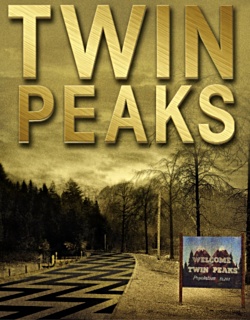 Naast zijn werk als regisseur is Lynch altijd actief gebleven als beeldend kunstenaar en heeft hij in de afgelopen decennia een grenzeloos oeuvre gecreëerd van onder andere schilderijen, tekeningen, litho’s, foto’s, lampsculpturen, muziek en installaties.
Naast zijn werk als regisseur is Lynch altijd actief gebleven als beeldend kunstenaar en heeft hij in de afgelopen decennia een grenzeloos oeuvre gecreëerd van onder andere schilderijen, tekeningen, litho’s, foto’s, lampsculpturen, muziek en installaties.
Een oeuvre dat tot nu toe nog maar zelden is belicht en in musea werd getoond. Met ruim 500 werken brengt het Bonnefantenmuseum niet alleen de eerste Nederlandse museumpresentatie van Lynch’ beeldend oeuvre, maar ook de grootste overzichtstentoonstelling ooit.
David Lynch: Someone is in my House
30.11.2018 – 28.04.2019
David Lynch, beeldend kunstenaar
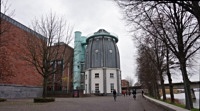 Anders dan het werk van Lynch (1946, Missoula, Montana, VS), vol duister geweld en seksualiteit, doet vermoeden, is de kindertijd van de kunstenaar en filmmaker gelukkig en liefdevol.
Anders dan het werk van Lynch (1946, Missoula, Montana, VS), vol duister geweld en seksualiteit, doet vermoeden, is de kindertijd van de kunstenaar en filmmaker gelukkig en liefdevol.
Lynch groeit op met reislustige ouders en leidt op jonge leeftijd een nomadenbestaan, een voor hem idyllische en veilige omgeving. Van jongs af aan aangemoedigd om zich creatief te ontplooien – kleurboeken waren uit den boze, eigen verbeelding gebruiken was het credo – komt hij uiteindelijk op de Pennsylvania Academy of the Fine Arts in Philadelphia terecht om schilderkunst te studeren.
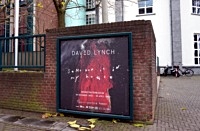 Hier ontwikkelt Lynch zijn artistieke vocabulaire en thema’s die blijvend aanwezig zullen zijn in zijn werk. En hier ligt de voedingsbodem voor zijn eerste mixed-media installatie met stop-motion film Six Men Getting Sick (Six Times) (1967), die een opmaat vormde naar zijn eerste speelfilm, Eraserhead (1977). De rest is (film)geschiedenis en inmiddels zijn Lynch’ films moderne klassiekers.
Hier ontwikkelt Lynch zijn artistieke vocabulaire en thema’s die blijvend aanwezig zullen zijn in zijn werk. En hier ligt de voedingsbodem voor zijn eerste mixed-media installatie met stop-motion film Six Men Getting Sick (Six Times) (1967), die een opmaat vormde naar zijn eerste speelfilm, Eraserhead (1977). De rest is (film)geschiedenis en inmiddels zijn Lynch’ films moderne klassiekers.
Lynch’ kunstenaarschap loopt als een rode draad door zijn leven en films. Hij is gedurende zijn vijftigjarige carrière altijd blijven tekenen en schilderen, ook als er vanwege zijn werk als filmregisseur weinig tijd was om in het atelier door te brengen.
“I miss painting when I’m not painting”, zegt Lynch zelf in de recente biografie Room to Dream. * David Lynch en Kristine McKenna. Room to Dream. Edinburgh, Canongate Books, 2018, p. 301
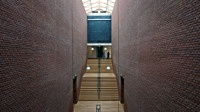 In samenwerking met David Lynch toont het Bonnefanten een indrukwekkend artistiek overzicht van het veelzijdige kunstenaarschap van Lynch.
In samenwerking met David Lynch toont het Bonnefanten een indrukwekkend artistiek overzicht van het veelzijdige kunstenaarschap van Lynch.
De tentoonstelling omvat schilderijen, foto’s, tekeningen, litho’s en aquarellen uit de jaren 60 tot heden, unieke tekeningen op luciferboekjes uit de jaren 70, schetsboektekeningen uit de jaren 60/70/80, zwart-wit foto’s uit verschillende periodes, waaronder de befaamde Snow Men-fotoserie (1993), cartoons uit de serie The Angriest Dog in the World (1982-1993), audiowerken én een aantal kortfilms uit 1968-2015.
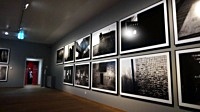 Voor het eerst sinds het ontstaan in 1967, zal ook het allesbepalende academiewerk Six Men Getting Sick (Six Times) in een museumtentoonstelling te zien zijn.
Voor het eerst sinds het ontstaan in 1967, zal ook het allesbepalende academiewerk Six Men Getting Sick (Six Times) in een museumtentoonstelling te zien zijn.
Publicatie
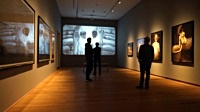 Bij de tentoonstelling verschijnt een rijk geïllustreerde monografie met tekstbijdragen van curator Stijn Huijts (artistiek directeur Bonnefantenmuseum), Kristine McKenna (journalist en curator, Verenigde Staten), Petra Giloy-Hirtz (schrijver en curator, Duitsland) en Michael Chabon (schrijver, Verenigde Staten). De publicatie is verkrijgbaar in het Nederlands, Engels en Frans en wordt uitgegeven door Uitgeverij Hannibal in samenwerking met Prestel.
Bij de tentoonstelling verschijnt een rijk geïllustreerde monografie met tekstbijdragen van curator Stijn Huijts (artistiek directeur Bonnefantenmuseum), Kristine McKenna (journalist en curator, Verenigde Staten), Petra Giloy-Hirtz (schrijver en curator, Duitsland) en Michael Chabon (schrijver, Verenigde Staten). De publicatie is verkrijgbaar in het Nederlands, Engels en Frans en wordt uitgegeven door Uitgeverij Hannibal in samenwerking met Prestel.
Tentoonstellingsteaser
 In aanloop naar zijn omvangrijke retrospectief Someone is in my House, maakte Lynch speciaal voor het Bonnefanten een unieke tentoonstellingsteaser. In deze typisch Lynchiaanse kortfilm, met in de hoofdrol naast Lynch zelf de ‘White Monkey’ – een personage dat eerder opdook in Lynch’ Weird daily weather report – nodigt hij de kijker uit om naar het Bonnefanten te komen.
In aanloop naar zijn omvangrijke retrospectief Someone is in my House, maakte Lynch speciaal voor het Bonnefanten een unieke tentoonstellingsteaser. In deze typisch Lynchiaanse kortfilm, met in de hoofdrol naast Lynch zelf de ‘White Monkey’ – een personage dat eerder opdook in Lynch’ Weird daily weather report – nodigt hij de kijker uit om naar het Bonnefanten te komen.
Flankerend programma
 Parallel aan de tentoonstelling is er in samenwerking met Lumière Cinema in Maastricht een compleet filmretrospectief gewijd aan de films en het leven van David Lynch met filmvertoningen, documentaires en lezingen over de filmmaker.
Parallel aan de tentoonstelling is er in samenwerking met Lumière Cinema in Maastricht een compleet filmretrospectief gewijd aan de films en het leven van David Lynch met filmvertoningen, documentaires en lezingen over de filmmaker.
Daarnaast brengt EYE filmmuseum drie digitaal gerestaureerde films opnieuw uit in de filmtheaters in heel het land. Voor meer informatie: https://www.eyefilm.nl/themas/gerestaureerde-david-lynch-klassiekers
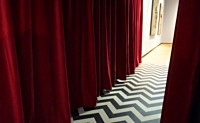 De philharmonie zuidnederland werkte met de Poolse componist Marek Zebrowski aan een compositie en uitvoering van Music for David, een strijkkwartet dat Zebrowski in 2015 componeerde als een hommage aan Lynch, die op zijn beurt de korte animatie film Pożar (Fire) maakte bij Zebrowski’s compositie. Het muziekstuk zal een aantal keren live (op zaal) bij de film ten gehore worden gebracht.
De philharmonie zuidnederland werkte met de Poolse componist Marek Zebrowski aan een compositie en uitvoering van Music for David, een strijkkwartet dat Zebrowski in 2015 componeerde als een hommage aan Lynch, die op zijn beurt de korte animatie film Pożar (Fire) maakte bij Zebrowski’s compositie. Het muziekstuk zal een aantal keren live (op zaal) bij de film ten gehore worden gebracht.
# meer informatie op website Bonnefantenmuseum
# Expositie & publicatie
David Lynch: Someone is in my House
30.11.2018 – 28.04.2019
• photos: jef van kempen
• fleursdumal.nl magazine
More in: #Archive A-Z Sound Poetry, *Concrete + Visual Poetry K-O, - Book News, - Bookstores, Archive K-L, Art & Literature News, AUDIO, CINEMA, RADIO & TV, David Lynch, Exhibition Archive, FDM Art Gallery, Jef van Kempen Photos & Drawings, Museum of Literary Treasures, Photography, Tales of Mystery & Imagination, THEATRE
Undeterred by the embarrassing success of his ridiculous four-volume verse epic The Limerickiad, award-winning cartoonist Martin Rowson continues to lower the tone with a series of metrical rants and cautionary tales about contemporary political and literary life.
 Accompanied by the ghosts of Chesterton, Shelley, Burns and Browning, Rowson casts his gaze across the satirical spectrum from governments, gammon-faced racists, class war, nationalism and the harsh realities of child rearing to the world of literary festivals, international book fairs, best-sellers, book-launches, holiday reading lists, bottom lines, liggers, bloggers, blaggers, book-signings and book-burnings.
Accompanied by the ghosts of Chesterton, Shelley, Burns and Browning, Rowson casts his gaze across the satirical spectrum from governments, gammon-faced racists, class war, nationalism and the harsh realities of child rearing to the world of literary festivals, international book fairs, best-sellers, book-launches, holiday reading lists, bottom lines, liggers, bloggers, blaggers, book-signings and book-burnings.
Martin Rowson is an award-winning cartoonist whose work appears regularly in The Guardian, The Independent on Sunday, The Daily Mirror, The Morning Star and many other publications.
His books include graphic adaptations of The Waste Land, Tristram Shandy and Gulliver’s Travels. Among his other books are Snatches, The Dog Allusion, Fuck, Stuff (long-listed for the Samuel Johnson Prize) and four volumes of The Limerickiad. His most recent book is The Communist Manifesto: A Graphic Novel.
Martin Rowson
Pastrami Faced Racist
Published by Smokestack Books
Release date: 01 Nov. 2018
Language: English
Paperback
84 pages
ISBN-10: 1999827686
ISBN-13: 978-1999827687
£8.99
# new books
Martin Rowson
Pastrami Faced Racist
• fleursdumal.nl magazine
More in: - Book News, - Book Stories, Archive Q-R, Archive Q-R, Art & Literature News, Illustrators, Illustration
“And I? May I say nothing, my lord?” With these words, Oscar Wilde’s courtroom trials came to a close. The lord in question, High Court justice Sir Alfred Wills, sent Wilde to the cells, sentenced to two years in prison with hard labor for the crime of “gross indecency” with other men.
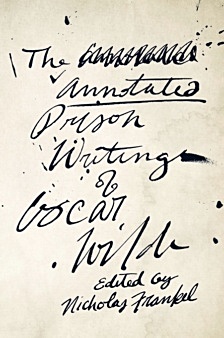 As cries of “shame” emanated from the gallery, the convicted aesthete was roundly silenced.
As cries of “shame” emanated from the gallery, the convicted aesthete was roundly silenced.
But he did not remain so. Behind bars and in the period immediately after his release, Wilde wrote two of his most powerful works—the long autobiographical letter De Profundis and an expansive best-selling poem, The Ballad of Reading Gaol.
In The Annotated Prison Writings of Oscar Wilde, Nicholas Frankel collects these and other prison writings, accompanied by historical illustrations and his rich facing-page annotations. As Frankel shows, Wilde experienced prison conditions designed to break even the toughest spirit, and yet his writings from this period display an imaginative and verbal brilliance left largely intact.
Wilde also remained politically steadfast, determined that his writings should inspire improvements to Victorian England’s grotesque regimes of punishment. But while his reformist impulse spoke to his moment, Wilde also wrote for eternity.
At once a savage indictment of the society that jailed him and a moving testimony to private sufferings, Wilde’s prison writings—illuminated by Frankel’s extensive notes—reveal a very different man from the famous dandy and aesthete who shocked and amused the English-speaking world.
Nicholas Frankel is Professor of English at Virginia Commonwealth University.
“Frankel provides a valuable service in comprehensively editing these works for a fresh generation of readers.” — Joseph Bristow, University of California, Los Angeles
The Annotated Prison Writings of Oscar Wilde
Oscar Wilde
Edited by Nicholas Frankel
Harvard University Press
Paperback
408 pages
Publication: May 2018
ISBN 9780674984387
€17.00
# more books
The Annotated Prison Writings of Oscar Wilde
-Clemency Petition to the Home Secretary, 2 July 1896
-De Profundis
-Letter to the Daily Chronicle, 27 May 1897
-The Ballad of Reading Gaol
-Letter to the Daily Chronicle, 23 March 1898
• fleursdumal.nl magazine
More in: - Book News, - Book Stories, Archive W-X, Archive W-X, Art & Literature News, CRIME & PUNISHMENT, REPRESSION OF WRITERS, JOURNALISTS & ARTISTS, Wilde, Oscar, Wilde, Oscar
What does it mean to fight for a ‘mother country’ that refuses to accept you as one of its own?
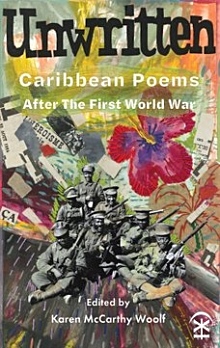 Britain’s First World War poets changed the way we view military conflict and had a deep impact on the national psyche. Yet the stories of the 15,600 volunteers who signed up to the British West Indian Regiment remain largely unknown. Sadly, these citizens of empire were not embraced as compatriots on an equal footing. Instead they faced prejudice, injustice and discrimination while being confined to menial and auxiliary work, regardless of rank or status.
Britain’s First World War poets changed the way we view military conflict and had a deep impact on the national psyche. Yet the stories of the 15,600 volunteers who signed up to the British West Indian Regiment remain largely unknown. Sadly, these citizens of empire were not embraced as compatriots on an equal footing. Instead they faced prejudice, injustice and discrimination while being confined to menial and auxiliary work, regardless of rank or status.
As a collaborative project, co-commissioned by 14-18 NOW, BBC Contains Strong Language and the British Council, Unwritten Poems invited contemporary Caribbean and Caribbean diaspora poets to write into that vexed space, and explore the nature of war and humanity – as it exists now, and at a time when Britain’s colonial ambitions were still at a peak. Unwritten: Caribbean Poems After the First World War is a result of that provocation and also includes new material written for broadcast and live performance.
Unwritten:
Caribbean Poems After the First World War
by Karen McCarthy Woolf (Author, Editor)
With contributions from Jay Bernard, Malika Booker, Kat Francois, Jay T. John, Anthony Joseph, Ishion Hutchinson, Charnell Lucien, Vladimir Lucien, Rachel Manley, Tanya Shirley and Karen McCarthy Woolf.
Paperback
Publisher: Nine Arches Press
4 Oct. 2018
Poetry
Language: English
ISBN-10: 1911027298
ISBN-13: 978-1911027294
Product Dimensions: 16.3 x 1 x 23 cm
160 pages
Price: £14.99
# new book
Caribbean Poems After the First World War
• fleursdumal.nl magazine
More in: #Editors Choice Archiv, #More Poetry Archives, - Book News, - Bookstores, Archive W-X, Art & Literature News
Thank you for reading Fleurs du Mal - magazine for art & literature